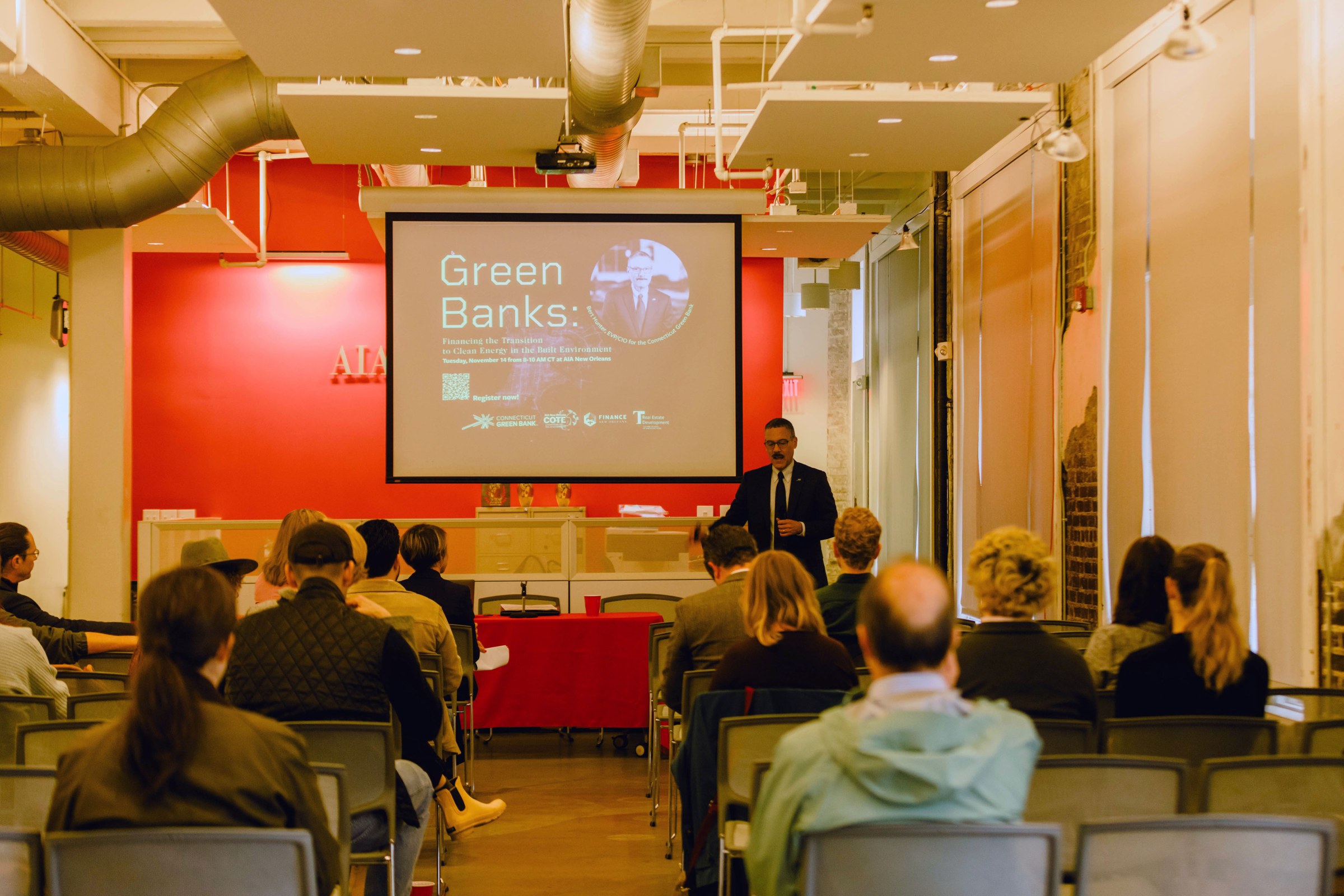Transitioning to clean energy in the built environment

Tulane convenes clean-energy, finance and real estate development professionals at Green Banks event
november 17, 2023
Story by Naomi King Englar
Dozens of real estate developers, finance and design professionals and Tulane students gathered in November 2023 in downtown New Orleans to learn about innovative models of financing to achieve cleaner, less expensive, and more reliable sources of energy, thanks to a lecture, panel and roundtable hosted by the Real Estate Development Program at Tulane School of Architecture (TuSA).
Green banks are mission-driven institutions that leverage private financing to accelerate the transition to clean energy and mitigate climate change. Louisiana is working to establish a statewide green bank, and New Orleans already has one in Finance New Orleans, which co-hosted last week’s event.
“The School of Architecture hosted this event with Finance New Orleans in part to ensure that our students are on the cutting edge of community needs and financing opportunities in real estate development nationally,” said Casius Pealer, Shane Professor of Practice and Director of TuSA’s Real Estate Development Program, which offers graduate and undergraduate degrees, as well as a summer-intensive undergraduate minor. “But we also want to work locally to support institutions like Finance New Orleans as they expand their impact, compete for increased federal funding, and leverage private capital.
The event led with a presentation from Bert Hunter, Executive Vice President and Chief Investment Officer of Connecticut Green Bank, established in 2011 as the nation’s first statewide green bank. Hunter then joined a panel discussion, led by Annie Clark, Chief Programs Officer at Finance New Orleans, and Jackie Dadakis, CEO at Green Coast Enterprises. Both Clark and Dadakis also serve as adjunct faculty in the School of Architecture’s real estate program.
“As a student who is passionate about developing better buildings, it is exciting and motivating to hear from professionals who understand the importance and urgency of implementing more sustainable and energy-efficient buildings," said Rebecca Callegan, a graduate student pursing a Master of Sustainable Real Estate Development at TuSA. "Connecticut Green Bank’s overall strategy for investing in local communities is the key to its success, in my opinion, and I look forward to similar successes for Louisiana."
The presentation and panel also shed light on the need for a variety of professionals in the green banking industry. Hunter shared that of the 55 employees at Connecticut Green Bank, only 7 are in finance and accounting positions. Many other positions at the bank specialize in architecture, project development, community engagement, legal, and public policy. Similarly, the green bank’s programs fund economic development and substantial local job creation across multiple fields.
Following the presentation and panel, an invited group of local multifamily developers and funders met with Hunter to learn from Connecticut Green Bank’s successful track record. Since its establishment in 2011, the bank has attracted over $2.26 billion in capital for clean energy projects while reducing energy costs for over 60,000 families and 6,500 businesses in Connecticut—roughly $7 in private capital for every $1 invested directly by the bank. Notably, the Connecticut legislature recently expanded the green bank mission to include new areas of environmental infrastructure related to resiliency, such as land conservation, agriculture, water and waste recycling, and parks and recreation.
The federal government, through the U.S. Environmental Protection Agency (EPA), recently launched $27 billion in funding for clean energy solutions under the Greenhouse Gas Reduction Fund, an Inflation Reduction Act program. The funds will be distributed through a competitive proposal process, and Finance New Orleans anticipates receiving significant additional capital next year to scale up their work and impact. In addition to the Inflation Reduction Act programs, New Orleans’ City Council and Mayor LaToya Cantrell have also committed $300,000 to support this endeavor while they continue searching for other funding opportunities.
“Every day, we hear from the community expressing their desire to transition to clean energy and ensure their buildings are more energy efficient. Their biggest problem is they don’t have access to the funds to make it happen. And, as an organization, we refuse to allow that to be the reason that our people don’t access to better, healthier lifestyles,” said Finance New Orleans Chief Programs Officer Annie Clark. “We are dedicated to connecting with our partners to mobilize public, private and philanthropic dollars to get these projects deployed.”
RELATED
Jesse Keenan's research leads to federal regulations on resiliency
New regulations from the Federal Reserve were based on research and recommendations from Jesse M. Keenan, an associate professor at Tulane School of Architecture.
